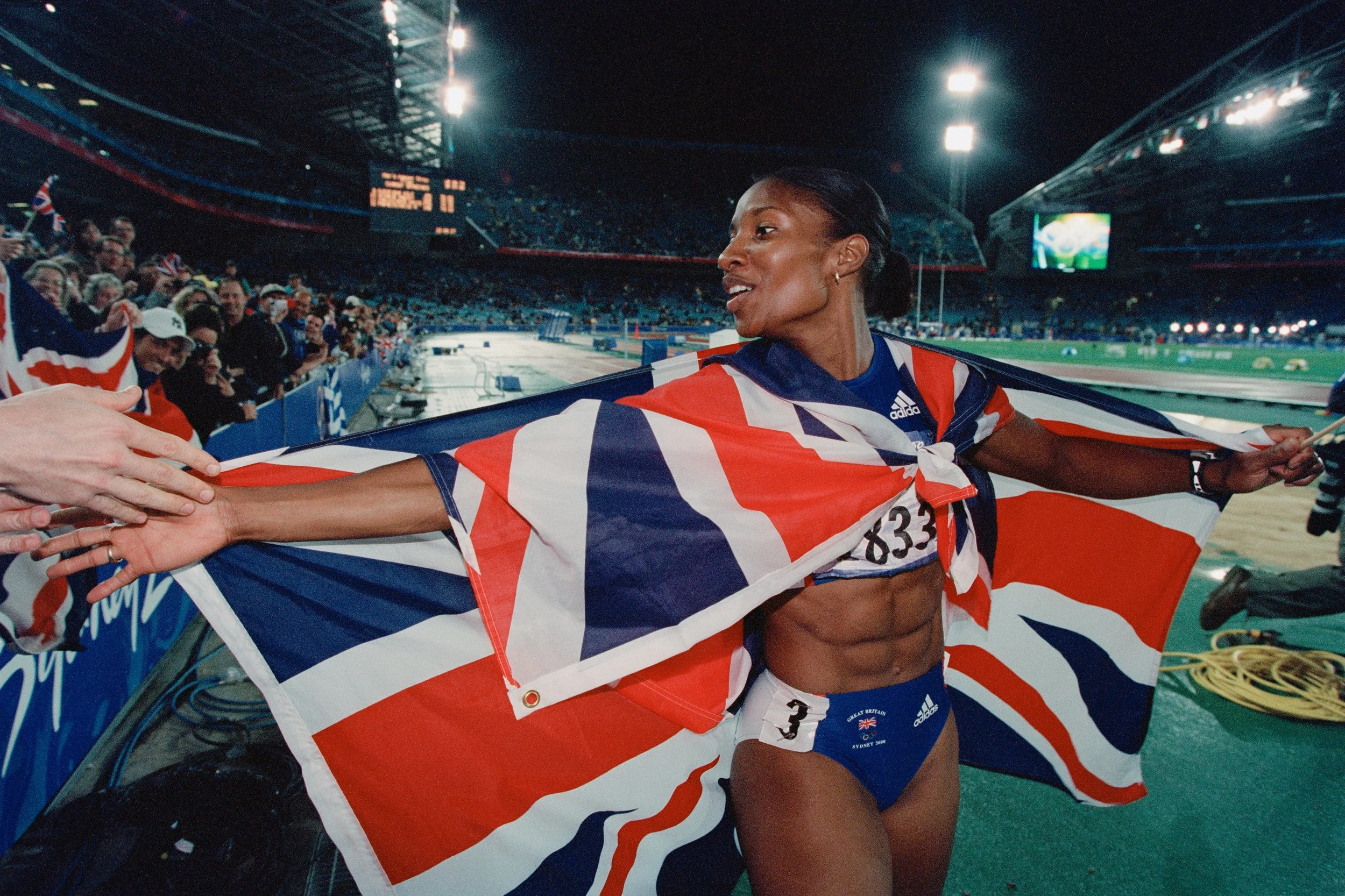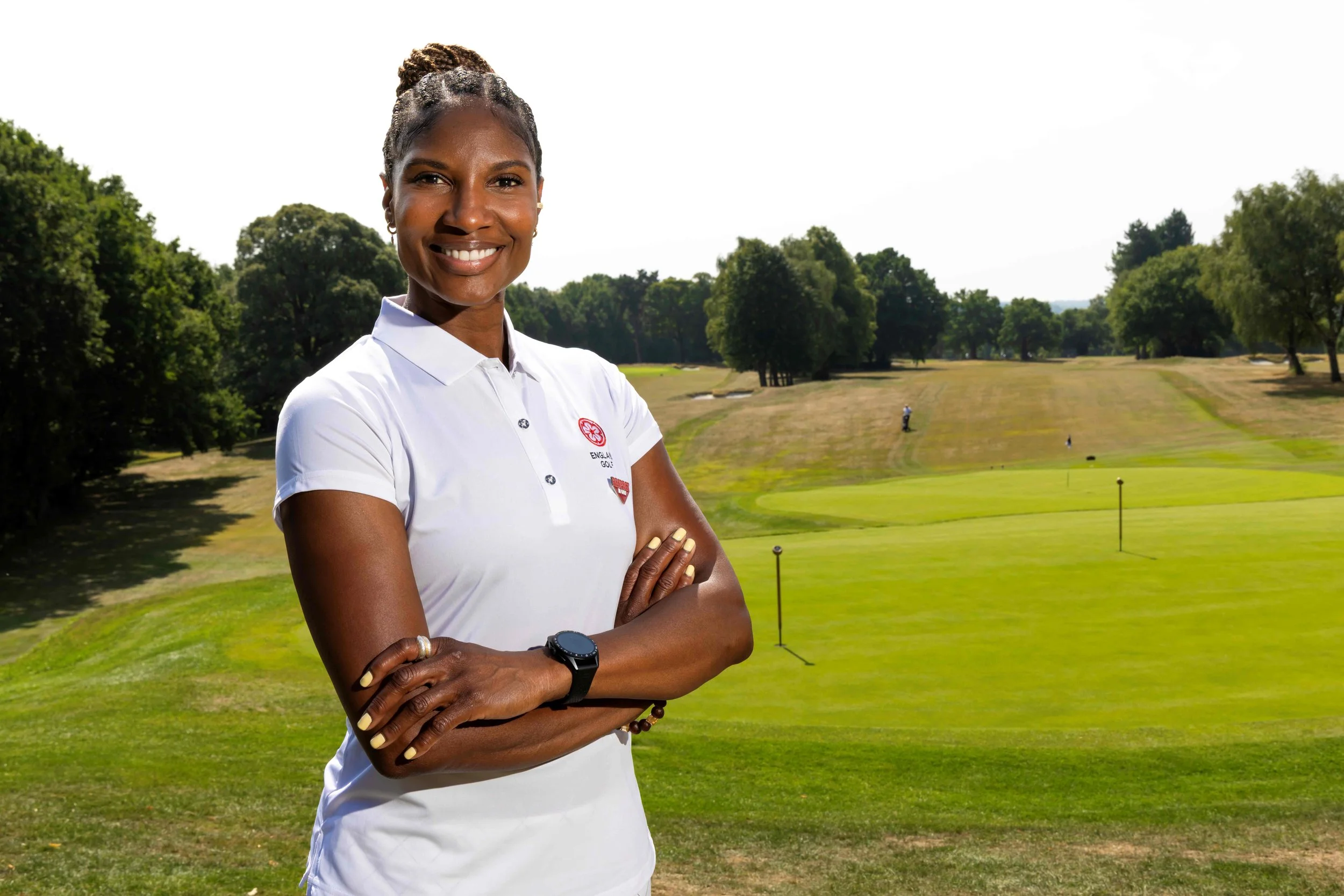THE INSPIRATION
Dame Denise Lewis:
‘The beauty of golf is that anyone can play it’
The Olympic gold medallist and former broadcaster on the positives of golf as a second sport and why it still has a way to go on inclusivity

Dame Denise Lewis is the president of UK Athletics and won the gold medal in the heptathlon at the 2000 Olympics in Sydney. A renowned presenter and speaker – and regular BBC pundit for more than a decade – she is also the president of Commonwealth Games England and a passionate advocate for health and wellbeing.
Earlier this year she became an England Golf Ambassador and part of the organisation’s Game Changers campaign to showcase golf as a safe, inclusive, sustainable and inspirational sport.
How did you get into golf?
I remember watching The Masters on TV back in 2007 which sparked curiosity, and my husband suggested I take a lesson.
Can you remember your first lesson? Who gave it? And how did it inspire you to continue?
My first lesson was with Paul Williams at Topgolf in Watford - he didn’t overcomplicate the technique or mansplain. His coaching style was supportive and fun.
How did your role as an England Golf Ambassador arise?
I’ve been friends with Julia Regis, Cyrille Regis’s wife – who does great work in golf around inclusion, and she sits on the Board for England Golf. I met with Jeremy (Tomlinson, CEO of England Golf) and his passion and enthusiasm for wanting to bring about change within England Golf aligned with my values in sport.
What are you hoping to bring as part of the Game Changers initiative?
I’m hoping to inspire more people to take up the sport and have a lifelong affiliation with it, particularly more women and girls. It’s a sport that gives you so many benefits from a physical, mental and social perspective and gets you out in the fresh air with friends – what’s not to love?
Golf is changing and female participation is rising, but you have noted there’s still work to do. How do we make grassroots golf more welcoming, more diverse, and how do we make it more attractive to women and girls?
I think the wheels are already in motion in terms of achieving meaningful change - particularly through the Respect in Golf movement.
Obviously, all clubs and counties are Respect in Golf accredited, meaning that they have all the correct policies and procedures in place, but it’s about ensuring that the culture at golf clubs is succeeding too – being inclusive and welcoming.
Golf has had long-held perceptions of being a white, middle-class man’s game, but we know that it’s far from that, with so many people of all different backgrounds loving the game.
There are already women’s and girls’ programmes like Women on Par and Girls’ Golf Rocks, while the Golf Fore Her initiative is also playing a role around raising awareness of women’s health in the game. There is so much already taking place and with great role models like Charley Hull, Georgia Hall and Lottie Woad - I think it’ll only inspire more.
Golf likes to concentrate on membership. Do we need to acknowledge there are different ways for people to participate and do clubs need to embrace that more?
The more clubs that embrace independent golfers the better – that’s what iGolf and iPlay are there for. The journey is there for anyone to get into the game – iPlay for the beginners and iGolf for those wanting to get a handicap and track their progress - and the numbers are continuing to grow.
Golf is also a sport that in recent years has focused on youth. You’ve spoken about the impact golf has had on your mum's life. Is there a danger the sport focuses too narrowly?
The beauty of golf is that anyone can play it. Not many people over the age of 50 can play certain sports, but golf is one many can enjoy late into their lives.
So with that, I don’t think we need to worry about people taking the game up later in life – the focus is on getting more youngsters and women into the game so they have a lifelong affiliation with it. And then of course it’s about making sure everyone who’s already in the game feels supported, empowered and that they can thrive within it.
Can you talk about the positives of golf as a second sport?
Golf keeps me cognitively and physically challenged. Being outside brings its own stimulation which is good for mental balance. I get to meet and play with some really interesting people.
What do you think golf can learn from other sports?
Golf still has some way to bridge the gap around inclusivity and accessibility in the UK. There are new initiatives emerging globally (TGL), which look great. I’d like to see a real focus on investors creating something special for the women’s game too.
“I’m hoping to inspire more people to take up the sport and have a lifelong affiliation with it”

Get golf business insights straight to your inbox
Sign up for the first look at the latest news, features, exclusive interviews and podcast episodes with our monthly newsletter


